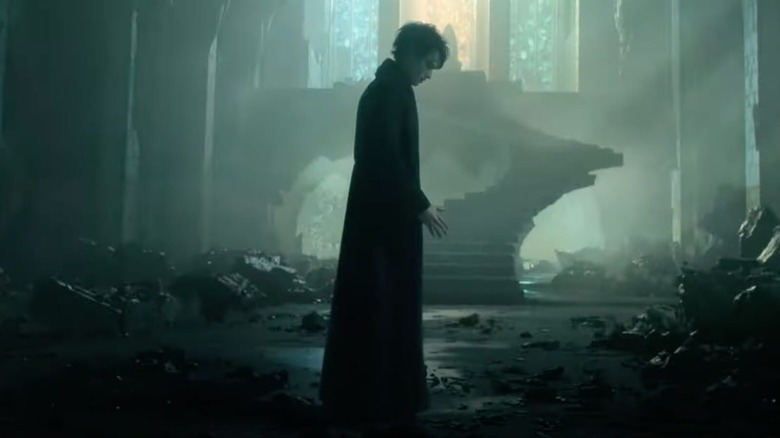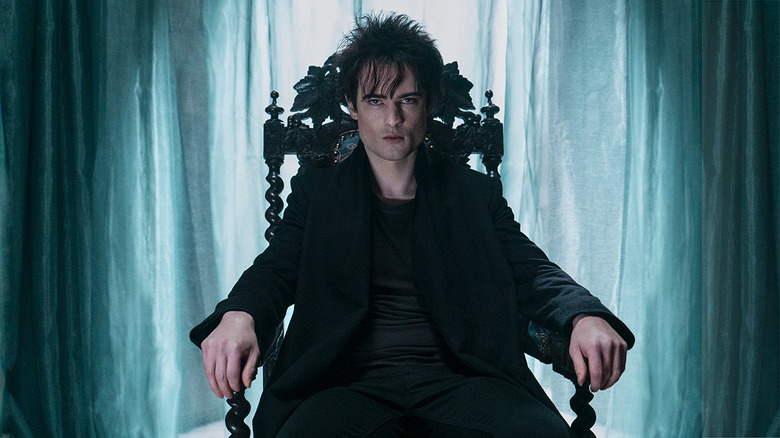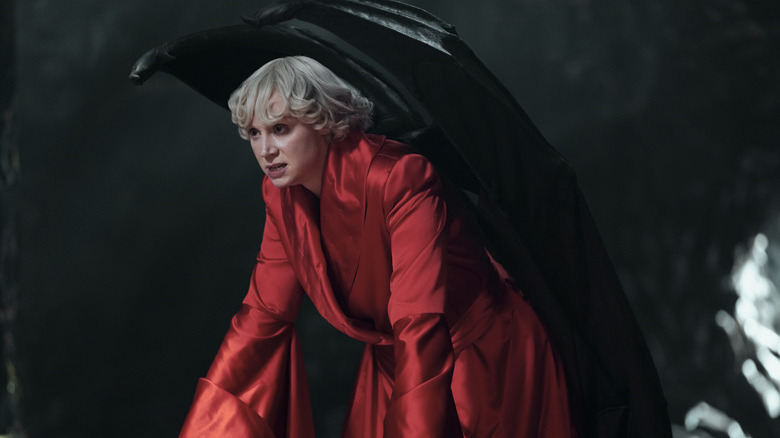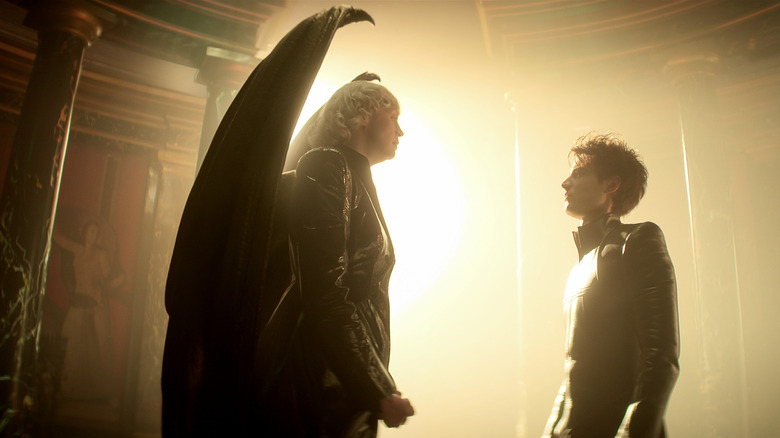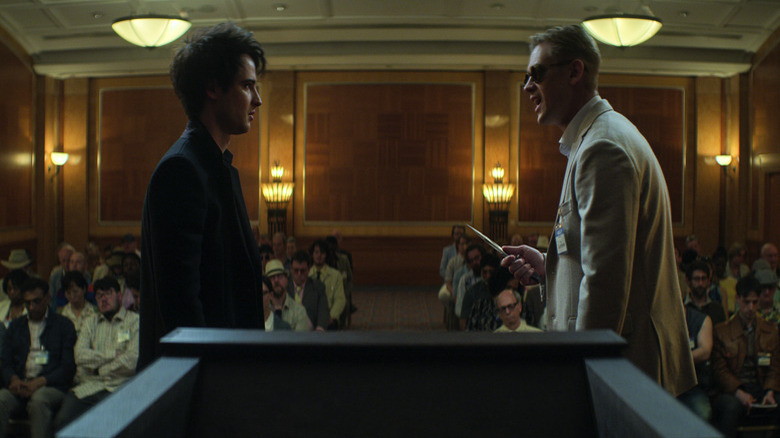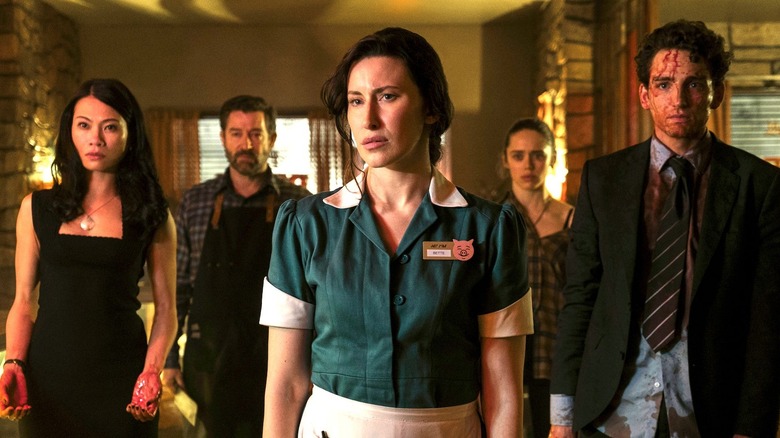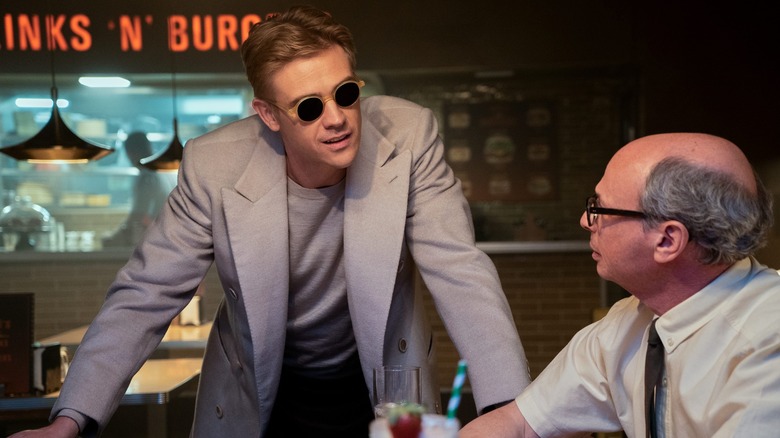The Sandman Composer David Buckley Breaks Down Highlights From Season 1 [Spoiler Interview]
David Buckley didn't want a traditional score for "The Sandman." It's an unconventional fantasy series about dreams, so why stay grounded to reality? Buckley wanted to create music that was beautiful, lush, and often strange and indescribable. Most of all, he wanted to respect the audience. He didn't need to always shout at them with music to be excited, to be afraid, or to be wowed.
It's a graceful score from Buckley, who's nothing if not versatile. He previously worked on "The Town," "The Nice Guys," "Nobody," and CBS' "Evil," to name just a few of his many projects. He's scored plenty of action in his day, but with "Sandman," beauty was the key word. Recently, Buckley told us about his approach to the long-awaited Netflix series and scoring some standout moments in the first season.
Note: Spoilers ahead. This interview has been lightly edited for brevity and clarity.
'Dream looks a little bit like the lead singer from The Cure'
How deeply did you feel like you had to dig into the world of "Sandman," or were you really just responding to the work you were seeing on the screen?
I'm a newcomer. I think it's fairly normal for people who work in the industry. It's not like we have to be fans of something in order to get a job. It'd be slightly odd, I think, or it would be quite limiting. But I did think, it's obviously based on some kind of content and there's a fan following, and this show has been trying to get it off its feet for decades and all sorts of buzz about it, I thought I need to honor everything about it, from Neil's initial comics to people's expectations ... well, people's expectations to a certain extent. I can't really be governed by that.
Impossible to gauge, anyway, right?
Yeah, exactly. Yeah. The beginning of the process, for me, was one of getting invested in the world. Nothing to do with music, just really reading the comics, which I got online and trying to absorb the source material and then talking to the producers and the showrunner about what they'd been up to, what they were trying to do with it. What's the difference between this and the comics and what are they trying to do? That was a big initial part of the process for me, which, broadly speaking, is the same with anything I do, but obviously when there is folklore attached to it and source material, then I do think one needs to go there and mug up a bit on all that stuff.
Did you ever have a conversation with Neil and maybe discuss what he imagined the sound of the world was originally like?
I didn't really communicate directly with Neil. I think all shows work in different ways. My main point of contact was the showrunner, Adam Heinberg. He would have been talking to Neil every single day. I know something came up, at one point, and it didn't occur to me, but Dream looks a little bit like the lead singer from The Cure. There was some talk about the score sounding like The Cure. And then I was told, "But obviously that's not what you are going to be doing." I was like, "Phew. Okay, because that's not what I do. I don't write Cure-like music. If they want Cure-like music, go and ask The Cure. If you want someone who knocks off The Cure, go and ask someone who knocks off The Cure. Two things that I don't do: Cure, or Cure knock-offs.
So, I mean, no, I never got into that conversation directly. There was no real order from above. It wasn't like, "It's got to be this. It's got to be that. It's got to be symphonic. It's got to be atmospheric." So there was none of that.
I watched some early cuts when I got involved. I could tell that this was going to be an eclectic thing, because the story is eclectic. When I was in the running as one of the composers, I knew that it needed someone who was nimble enough to be able to move from writing for an orchestra, to doing some sound design stuff — someone who could get their head around quite a few different styles of writing.
Never was I told that it had to be this, that, and the other. Thank God, because that would be a fairly daunting thing. I always tend to think that when one is hired for a job, that there is something in one's back catalog that people like. I don't think it's just my winning personality.
They hired you for a reason, yes.
It may just be because of my good looks and charm, but I'm inclined to think that there was something that I've done before [Laughs]. I don't think it's like, "Oh that score you did for 'The Town'? That's what we want," because that would be boring. No one wants to replicate their work from another thing and just plunk it on there. No satisfaction would be derived from that.
I'm adamant that people feel something. And I think, "Ah, yeah. What I feel there, I want to feel here." Then you get into the nuts and bolts of how you actually manifest that, musically.
'Hell and Lucifer have been given life in music in so many shows and so many films'
Getting to the nuts and bolts, how did you want to compose your theme for Dream?
Well, he's a complex figure. With Dream, I had to try and get a glimpse of all the components of his character. I suppose I glimpsed as far as I could, in terms of whatever had been shot at that point, and that melodic thing that plays over the prologue and then pretty much exists throughout all 10 episodes, became his tune. It's a difficult one for me to say, how [I came up with it], because, in a sense, I'm hoping that the music itself answers the question, in a way.
One thing that I did often with his image — I mean, it has passed from different sonic elements. Sometimes it would be orchestral. There is a choral version. There are solo versions. But often he's got an instrument or two instruments. One is a Renaissance instrument called the viola da gamba. It comes from old world-y music.
I also, concurrently with that sound, I also have the very same melody played on a synth. So you kind of get this juxtaposition of 500 years in one melodic line. What I was often doing with the whole score was doing things that were kind of tickling, not necessarily even the ear, just tickling the back of one's consciousness. Just being a little bit kind of weird — but not ostentatious, not in your face, aggressive-weird. Just a little bit like, "Oh, I thought that was a string section and it just had this strange little sound, floating at the end."
Lucifer is a good example of that. You hear these pangs of strings almost, like you can't tell if it's sound design or score.
Exactly. The thing is, Hell and Lucifer have been given life in music in so many shows and so many films. Often, it's a sort of, "Dun-dun-dah," hellish sound. Now it's not to say I was trying to paint an overtly pretty picture of Hell, although it's interesting. Lucifer is a woman. She is blonde. She looks like something out of a Pre-Raphaelite painting. For most of the score, there isn't any real reason for me to be bombastic and burrow in your face. I never was asked to do that, and I never felt the compulsion to do that.
With Hell, there is, on paper, a kind of noir-ish character. I want to feel something a bit unsettling and I want us to feel something a bit unsettling, but it's also, I absolutely loved that scene. Well, I think it's sort of the world's oldest game between her and Dream.
I don't know if I saw the final visual effects in that, but there's one moment where one of the characters says, "I am the universe," and then he pans out and it goes black. Those were moments of beauty. So even in Hell, there was no problem with having a moment of radiant lushness.
What I loved about what I was able to do on the show, and encouraged to do, was try and be beautiful with the music. I wasn't trying to write cheesy syrup. I was trying to write something beautiful, even broken beauty, even fragile, decayed beauty. I think beauty was a word that was always on my mind. Death being an obvious example, that we don't want the notion of death to be terrifying and macabre, to use an obvious word. It should be warm and the death's warm embrace. It should be lovely, enveloping, and gorgeous.
It is because that was how it was shot. That is how the drama unfolds. I suppose I even asked the question, "Do you want to feel any more edge with Death?" It's like, "No. We want this to be lush and warm." I just love that. I mean, who doesn't like, if you're a composer and someone says, "Can you write some beautiful music?" You think, "Oh, yeah. I'll do my best."
'Audiences should be treated with intelligence and respect'
Like you said, even with the action, you don't go big with the score. It's refreshing to hear.
Absolutely. I mean, look, when I was in the running for the job and I was talking to one of the producers, he said, "It's not an action show." And I was like, "Thank God for that," because I've done so much action over the years in movies and stuff, and it's kind of tiring. It's a bit deflating at the end. You spend all this time working on cue. You get tortured by the director or producers, saying, "It needs to be big. It needs to be louder. You need to add more stuff. More stuff."
You're looking at your screen and everything's like, distorting. It can't be bigger. And then they mix it and they turn it down like 20 [decibels] and bury it underneath all the sound effects. I've done a whole lot of that. If my agent gets his way, I'll probably do a whole lot more of that.
But when I was told, "This is not action-driven," I thought, "Well, something different is a good enough place for me to start." So when we did have these moments, my instinct, I didn't want to suddenly turn it on and just like, "Here we go. Let's crash, bang, wallop." I wanted to try and strip it down and do something that I hope is a bit more cerebral.
I certainly think, if you listen to that track on the album, I think it is called "The World's Oldest Game," it's weird voices and weird percussion. I don't think there's any orchestra really participating at that moment. I didn't want the orchestra to be part of that action thing. I just felt it was too standard.
There is one moment, I would say, towards the end of the show with the vortex where it goes a little bit more mainstream, just for 90 seconds. It's where they're all almost getting sucked into the vortex and there's some big kind of "Rrr," brass thing. I slightly had my hand twisted to go in that direction. I was left so much to do what I wanted to do, that if there was a moment where they wanted something specific, of course I'd oblige. I wasn't going to be a tricky customer.
My philosophy in general is — and I have to be careful when I say this, because it might make it sound as if I'm lazy or something — but I like the audience to work a little bit, in the process.
So you don't want to tell them how to feel, exactly?
I don't want to constantly tell them how to feel. Now look, there's a lot of music in the show and some people might argue there's a bit too much in there. I certainly don't want to just hold a tone and just say, "Now, audience. Now you imagine." I've got to give something, but I don't want to hammer it. I would say that applies to anything I've done. My instinct is not to hammer it and to have some holding back, just a little bit.
Again, this isn't about not wanting to commit or not knowing what I'm doing. It really is a case of, I think that this is a collaborative experience with score. The audience, if you just help them to go in a certain direction, then they can take it to where they want to take it, because audiences should be treated with intelligence and respect.
'He is an epic character in many ways'
Another good example of that is when the Dream kills the Corinthian. I think that moment ties into a lot of what you're saying. You don't make it sound triumphant, like good defeating evil.
Yeah, exactly right. You could imagine that, if this were Wagner opera, that would be a crescendo going all the way to there. And then the six horns come in and the bass trombone and none of it, it just didn't seem right. It didn't seem like that treatment was for this world.
I'm not saying that to have moments of extreme, heroic epic-ness is wrong. I'm just saying in context, I had to learn this world. I had to trust what I was looking at and the conversations I was having. There were a couple of moments where, for example, at the end of episode 5, which is set in the diner, the music is really quiet. That is probably the most sound design-y. Is it the score? Is it just noises from an air conditioning unit? I mean, that's really where I'm probably at my most restraint, in that episode, until the end when Dream comes in.
Because we haven't seen him. We saw him in the first 22 seconds, then we haven't seen him for the entirety of the episode, where John Dee is up to his ruby business, and then Dream has to come at the end and sort a few things out. There is a big brass section that comes in with Dream's arrival there.
Again, it's not like, "Dun-dun-dah." It's not that sort of thing, but it's just giving some gravitas to Dream, because he is, despite everything else, he is an epic character in many ways. Or he straddles that. He could be walking down a street in London, talking to his sister about relatively mundane stuff, or he can be this impressive, huge myth. He really does encompass so much.
What moments felt appropriate to go big with the score and maybe an orchestra?
If you think of episode 1, the opening is quite big. Now, I don't know how that was mixed in there. It was always going to be a challenge, because there was dialogue running all the way through it. I haven't watched the show, the final show. I tend not to do that. I can't sort of put myself back. But there are three big moments, I'd say, big score moments, in episode 1. There's the opening, which I think ultimately probably doesn't sound as big, because they probably had to turn it down so the dialogue could be heard.
Then there's this beautiful sequence where Jessamy, the bird, is trying to release Dream from prison. And that has quite a big score.
And then the very end, where Dream goes back to the dreaming and sees his decayed palace, that is full of red-blooded, full orchestra, choir, the works. And then the dynamics thereafter, in between those moments, are a lot more subtle and diminished. I want to see that when I'm looking at my screen, I want to see big shifts in wave forms. I want to see big peaks at the right moments.
I could do this in spades in this show. The dynamic range was big. The amount of sonic resources and the array, from the very loud to the minuscule, almost imperceptible. Episode 5, which I think is a really cool episode, I didn't put much of that on the soundtrack, because it doesn't work in the soundtrack environment.
It's so caught up with what's on screen. The best version of the music in 5 lives with what was shot, what was filmed and edited. That was totally made. I mean, all film, television music is made, but in this instance, I didn't feel it had any relevance to be on a soundtrack, because I think if you don't have the visuals, if you don't have that tension, if you don't have that spiraling, out of control mayhem ... it certainly becomes mayhem, but it's a slow burn, isn't it? And if you don't have that, then I think the music, in that instance, elevated the drama and the drama elevated the music. And so therefore, to put that on a soundtrack, it just didn't make any sense to me.
I completely believe in that music for that episode, though. It fun to do, because it was so different. For example, episode 2, where we got a cute little gargoyle. It was so soft and cuddly and then we went ... because that's how it sort of worked for me, I didn't necessarily always score these episodes sequentially because some of them weren't ready for me to score. I sort of hopped around. I do think I went from episode 1 to the cuteness of 2, to probably the most noir-ish thing I've ever scored in 5. I was jumping around.
'There's this very low, what I call Dr. Dre bass'
With what instruments did you want to create, as you put it, those "minuscule imperceptible" tones in episode 5?
For me, it's all about negative space. I mean, it's a tried and tested formula that you leave just sometimes the smallest whiff and hint of some unsettling sound, [and that] can do way more psychological harm, or leave a psychological impression, than having a big growl.
There's another show that I've scored called, "Evil," which is quite a fun show on CBS. It's very, very different to this and it's got a humorous thread running all the way through it, but there are moments of horror, as the name might suggest. Often I'll write a piece of music for it, and then I start pulling it out and then I get to this sparse version of it. We all agree, "Oh, that's the scariest version" when you've got rid of all the junk, when you get rid of all the stuff that you point at people and say, "Be scared. Be scared. Be scared," and then you find just this hovering, whimpering, decaying sound. And that's the one that makes you feel queasy. That's the one that makes you want to find your cushion to hide behind.
For me, episode 5 was a study in psychology, musical psychology, how to play with things. Real subtle manipulations of sounds, to make people feel increasingly on edge. It's not about writing a tune. It's not about being clever with harmony. It's about trying to mess with people, but in the most subtle way.
Again, when it comes to scoring different tones, you're clearly having a lot of fun with the cereal convention in episode 9. The strings are hilarious when Stephen Fry puts it all together.
Yeah. Well, again, we didn't want to play the serial killers, as we didn't want it to be a grim cue. We just didn't want grim music there. At the same time, there is definitely a playfulness in the music. That's one of my favorite tracks called, I think, "God Tells Me to Do It."
It's comically upbeat.
Yeah, it's got pep to it. In fact, I had to rewrite that, because the first time I wrote it, I got a note back saying that I'm making the serial killers feel like serial killers, that they're all sort of evil guys. They don't want to do that. There is also a mundanity to that convention. They could just as well be cleaning products.
When the Corinthian sits down and gets the applause, it almost sounds like a company commercial for a retreat or something.
That's an interesting one. Perhaps there, my instincts weren't necessarily quite right, because I went more serious on my first version of that cue. And I was, "No, no, no, no, no, no, no, no. We want to celebrate this guy. We want to like him. He's a good guy. He has a smile and a wink."
When you're doing a show which is off-kilter, it's like you do need some help, sometimes, to be told, "We want to approach this more this way than that way." Sometimes, unfortunately, the only way to actually have that conversation is to present a piece of music and be told, "No."
You can talk about stuff endlessly, and you can say, "Yeah, I'll do this." And then of course, when it actually becomes flesh, then there's a difference like, "Oh, that's what you meant by the color red." Ultimately, when you put a piece of music there, then you've got something tangible to either love or dissect.
What mood did you want to help strike with The Corinthian?
Yes, he has an awful lot of charm and he'd love to know what it's like to feel human. He's the villain there, but not in any stock or conventional sense. So this is quite a subtle sound, actually. It's two elements to his, I wouldn't really call it a theme, it's more a vibe for him, which is an electric trumpet, which is a moody, slightly washy, trumpet-y thing. It almost doesn't sound like a trumpet. And then there's this very low, what I call Dr. Dre bass, just a very slow moving bass with glissando in it. Like, "Duhn-brr-rrr." I don't even know on TV how well it translates, but it's got a little bit of sexiness within it, without it being a saxophone solo, which would be horrible.
When the Corinthian and Sandman crossed paths, musically, did you want to bring them together?
Yeah, if they do happen concurrently, I can't recall. It's quite a while now since I've actually worked on the show, because obviously, we put it in the can a number of months ago. So I can't recall a detail like that. I can recall another detail with Desire, which they have only a couple of moments within the show, but they are a very cool character.
So there's a theme, but then there's a moment within that theme. It's this weird vocal thing, but there's a moment within that, where they're talking back about Dream. And so, Dream's theme then reappears over Desire's theme. So the two things coexist. I mean, I think that's happening all over the place.
It's going back to my point about letting the audience enjoy it and not feel that I'm telling them what to do. I'm not desperate all the time to say just because a character comes on screen, that they have to have their theme playing the minute they come on screen, because that'd be pretty grim. I mean, it'd be pretty infantile. I mean, a standard kind of scoring procedure, characters have got musical identities and what feels best at any given moment, is my approach.
'Dreaming is weird'
Scores and shows evolve, of course, but what were some of your earliest ideas for "The Sandman" that stayed?
Well, it took a while to find the tone, I'd say. There were some missteps at the start. I found it hard to get into it. Genre-wise, where are we sitting? Is this fantasy? I think possibly, inevitably, I just couldn't quite kind of suss it out. There was time built into this, so I could screw up, which there often isn't on television shows. There's often no time for you to screw up. And when you do screw up, you're shown the door.
I had time to go a little bit wrong and then get closer. And really, when I hit on the main theme for Dream, which basically was initially manifested in the prologue, that was a huge sigh of relief for me and I think for everyone. It was sent around to all the producers, DC, and everyone. Everyone was enthusiastic about it.
And then, obviously, when you've got that kind of support and that belief in something that they said that they felt that feels like the show to them, it makes the job a lot easier. Not to say that there weren't huge hurdles to cross and trying to figure out how to mutate that sound into these ever disparate episodes, anywhere from Hell to 13th century London. Some people might say that those two things are the same, actually, with the Black Death.
The Dream theme was the one, because that embodies the show, obviously. It's Dream's show. That was the one that took the most time, but probably produced the most amount of good feeling from everyone when it was cracked.
To wrap, in scoring to this huge canvas, what were some of your unconventional influences? It was cool to hear about the Dr. Dre bass you had in mind.
Well, it's funny. I sent a soundtrack album to someone and they sent this really nice response. "My God, this is just beautiful, really amazing. It's so nice that you got to write a proper conventional score." And I was like, "Okay. Well, yeah. I know what you mean." There's an orchestra and stuff in there, but I do think there are things that are not conventional and the ear is taken to things differently in different ways.
I mean, frankly, I had this low bass thing. There's a synth I use to make it a synth, called Sylenth. I was just screwing around actually, even before I started the show. I was watching videos one night and I wanted to know how to make this really specific hip hop sound. I'd heard it in some tracks. I just thought, "How do you make that?" I literally sat down with a blank synth patch. I mean, that I hardly ever have time to do. I thought, "I want to make that sound." So, I made it and I thought, "Ah, the Corinthian. I'll use that."
And then with Dream, I used this 16th century instrument called a viola da gamba. "Awesome. I'll use that." And the sound of The Dreaming is a type of orchestral called a celeste, but I pitch shift it. I bend the sound, which is physically impossible to play. You literally cannot do that. But with sound processing manipulation, you can do it.
It's all a sequence of, just try it. It's fun. Dreaming is weird. We all dream. And it's all odd. It's all off-kilter. At the same time, there's this striving for beauty and human feelings as well. It's not the trickery, the gimmicks — the Dre bass and the bells are not there to serve themselves. They're there to serve the oddity of it all.
"The Sandman" season 1 is now streaming on Netflix.
